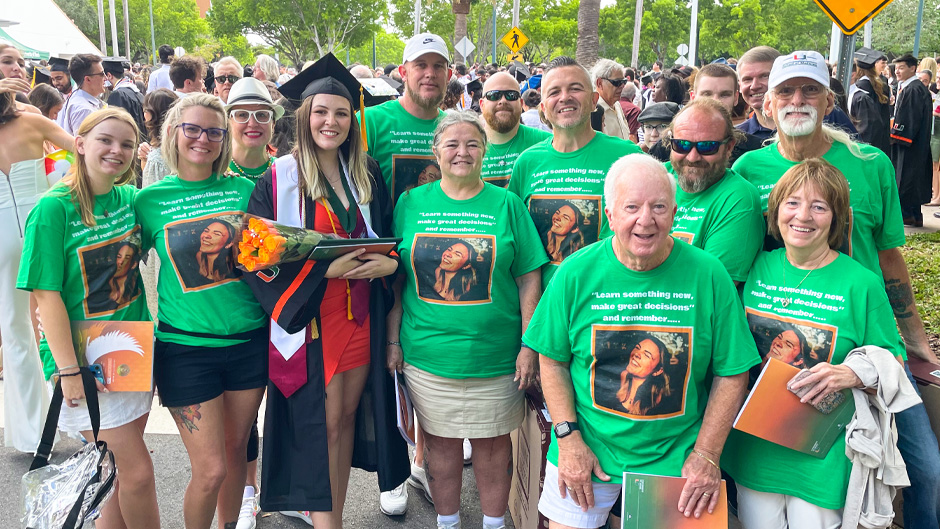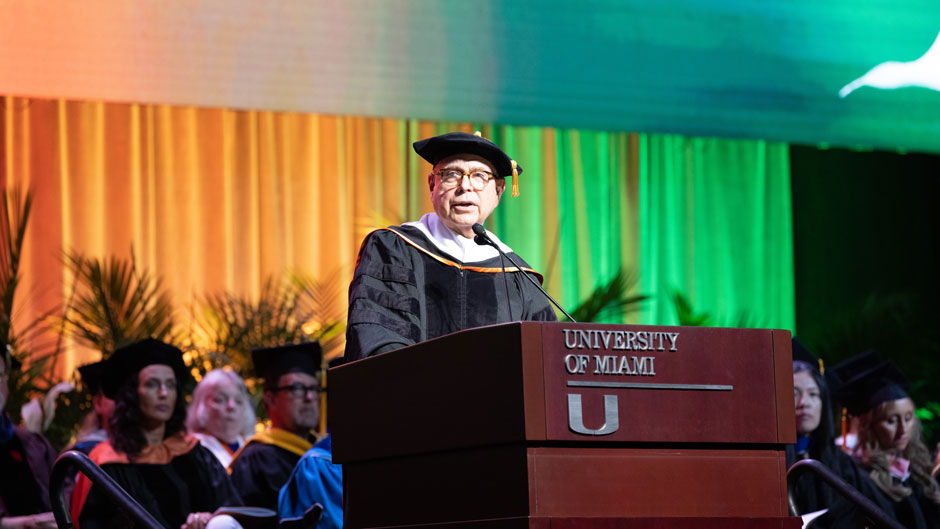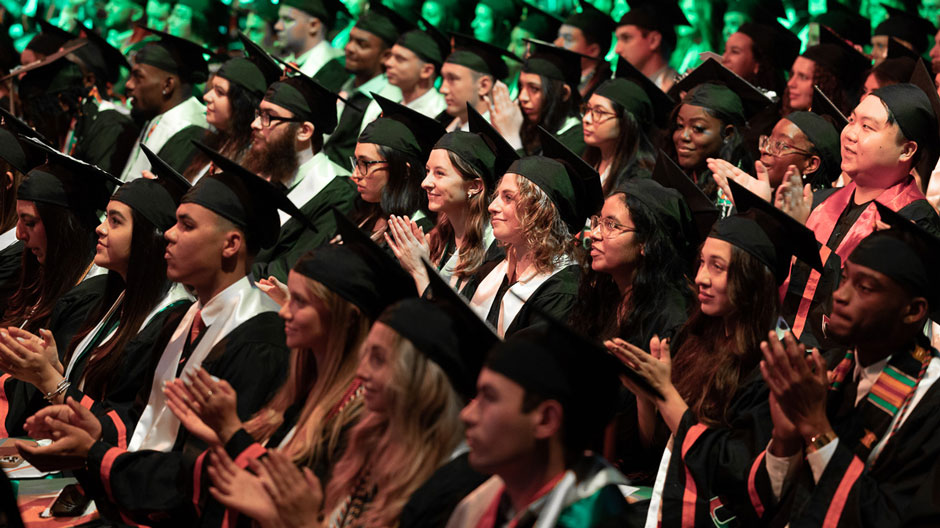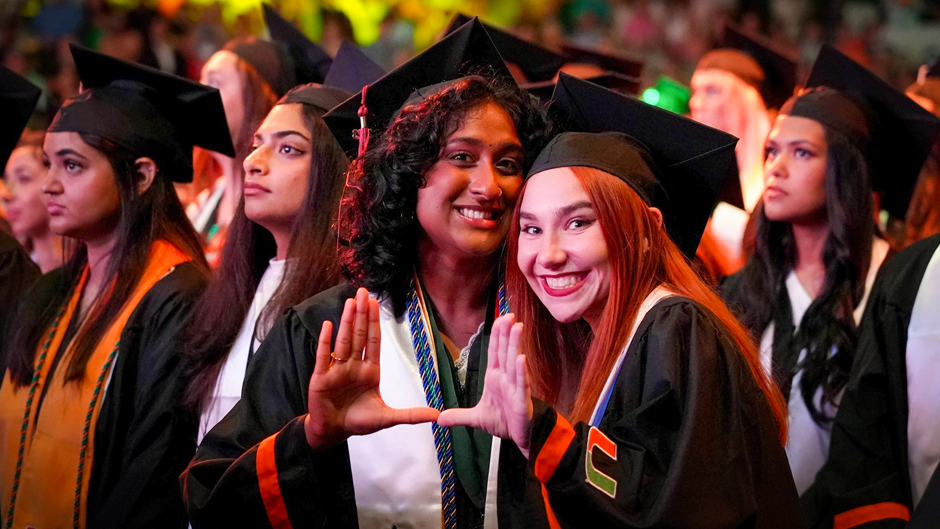Witnessing the suicide of a fellow sailor, struggling as a gay Naval officer under the military’s “don’t ask, don’t tell” policy, and dealing with the unrelenting pressures of disaster relief efforts during the 2011 earthquake, tsunami, and nuclear power plant disaster in Japan had pushed Eric Golnick to the point of mental and physical exhaustion.
“I decided enough was enough and left active duty,” the double University of Miami alumnus told hundreds of students Friday morning at the day’s first undergraduate commencement ceremony, which featured the College of Arts and Sciences and Division of Continuing and International Education.
“I felt like a failure for giving up,” said Golnick, who attended U.S. Navy’s Officer Candidate School after graduating with honors from the University in 2009. “I had wanted to be an officer in the Navy since high school and planned to make a career of it. And now my entire life was turned upside down.”
View photos and video from the 2023 Commencement Ceremonies
Special Report: Student profiles, special event coverage and more
But Golnick rallied. Faced with his darkest days of despair, which included bouts with post-traumatic stress disorder (PTSD) and alcohol abuse, he recalled his former drill instructor’s words of wisdom—“that our most immense growth is often found through pain and discomfort.”
And using that advice as inspiration, he resurrected his life. A position within the Department of Defense working in foreign policy and a master’s degree from the University were just the start. He would also go on to start a network of behavioral care clinics along the eastern seaboard that help veterans and first responders suffering from PTSD.
“The bottom line is, you are going to face hardships that will feel like failures at first, and that can be discouraging,” Golnick, who received an honorary doctor of humane letters at the ceremony, told graduates. “What we do in response to our stumbles determines our true strength. And in the grand scheme of things, you’ll never truly fail as long as you have resilience in the face of adversity.”
It was the first of three graduation ceremonies at the Watsco Center on Friday.
Alberto Ibargüen, president of the John S. and James L. Knight Foundation, addressed graduates at the afternoon ceremony for the School of Architecture; the School of Communication; the School of Education and Human Development; the Rosenstiel School of Marine, Atmospheric, and Earth Science; the Frost School of Music; and the School of Nursing and Health Studies.
And Manuel D. “Manny” Medina, founder and managing partner of Medina Capital, offered words of advice at the afternoon undergraduate degree ceremony for the Miami Herbert Business School and College of Engineering.
During the ceremonies, President Julio Frenk called the class of 2023 “shining examples of resilient ’Canes” who will change the world.
“Your path to a degree has not been a straight line,” he told the graduates. “You have changed the way you live and learn and made sacrifices for the sake of your education. Going through these experiences while pursuing a degree has given you the opportunity to learn—and practice—adaptability and resilience. No matter where your paths take you, I can guarantee you this: you will continue to use those skills.”
Golnick also told graduates that “being prepared for the unavoidable hardships in life will be vital” and that “taking care of your mental and physical health will make you all the more resilient when that time comes.”
It was his struggles with PTSD and substance abuse and the difficulties he faced during his treatment that inspired him to cofound Forge Health in 2016 with close friends and brothers Eric and Jon Frieman. Jon is a fellow ’Cane and Army infantry officer veteran.
“We had a great idea, and I took a leap of faith to leave my career in the government to start my next chapter as a health care executive for a behavioral health startup,” said Golnick, executive vice president of Forge Health. “Mind you, at the time, I knew absolutely nothing about health care, behavioral health, or frankly, business. So, it seemed like a great idea. Well, it was. It taught me that in addition to growth coming from stepping outside of your comfort zone, there is also no growth without risk.”
Meanwhile, Forge VFR (Veteran and First Responder)—which Golnick created to help improve the mental health and well-being of active-duty service members, veterans, first responders, and their families—has flourished since it began. In 2018, it secured a national-level partnership with the Veterans Administration and its Community Care Network to expand care within veteran communities and increase public-private partnerships, a key strategy of the National Strategy for Preventing Veteran Suicide.
Golnick explained to the graduates that what he lacked in experience, he made up for in determination to tackle a problem he had experienced firsthand. “We were driven by our determination, a willingness to learn, and frankly, our frustrations. And that right there is a recipe for success in any mission you undertake,” Golnick said.
Setbacks, he warned the graduates, are inevitable. “But if you take care of your mental health and seek support, you will always overcome,” he said. “And if you see a problem in the world, don’t wait for a hero to solve it. Be the hero. Embrace the uncomfortable and harness your resilience to make a positive impact on the world.”
Miami native Jorge Gonzalez graduated with a bachelor’s degree in English and psychology in three years and is now headed to law school in the fall. He was celebrating with family and friends outside the Watsco Center on Friday morning and said he felt very fortunate to have attended the University of Miami because the pre-law program prepared him well for the future.
“Graduating in three years is bittersweet because I’m leaving earlier than everyone else, but I’m feeling great and excited about what’s next,” he said. “Since I’m from Miami, I graduated from the Watsco in high school. But it did not compare to this. I had a goal to graduate and have a plan and I’ve been able to live up to it.”
Nearby, Arryanna Jordan was celebrating with 16 of her closest family and friends, most drove six hours from Jacksonville. The group was unmistakable in bright green T-shirts, which her mother, Heather, made for the occasion. On the front was a quote her father has told her since starting school: “Learn something new and make great decisions.”

“It’s been an amazing four years, and I wouldn’t trade it for the world,” said Jordan, who majored in neuroscience and is taking a gap year before applying to medical school. “I’m sad to be moving on, but I’m excited for my next steps too. I’ve loved it here.”
Before enrolling at the University of Miami, Kayla Giesler was worried she wouldn’t fit in because she would be a commuter student, traveling an hour each way to campus. She said her most memorable moment at the University was when she attended orientation.
“The moment I started, it was so warm and welcoming,” said Gielser, who obtained her bachelor’s degree in biochemistry and molecular biology. “All of the orientation fellows were so welcoming and it felt like a community right away.”
In the second undergraduate ceremony, Ibargüen addressed more than 800 graduates, celebrating them “for being as well-prepared to manage change and as comfortable with technology as any generation we’ve ever known.” He cautioned against the natural tendency to take for granted the environment we live in—be it ecological or societal.

That tendency, he suggested, is especially dangerous in the current context of the ever-changing media landscape and polarized society where democracy and pluralistic exchange are threatened.
“My charge for you today is to do the hard work to nurture the community and our democracy with your participation,” he said. “How you do that will be different for each of you, but it begins with being informed.”
Ibargüen shared that he has spent most of his adult life promoting informed and engaged communities.
“It’s an uphill battle,” he said. “Today it is easier than ever to find misinformation and harder than ever to find solid local news. We keep electing people based on a geographic structure of democracy, and we’re electing people we don’t know to do things we’ll never hear about—that’s a train crash begging to happen.”
It’s our job as citizens, the former Miami Herald publisher said, to ask the hard questions and find facts, not opinions on which to base your actions and votes.
Ibargüen shared his experience as a student reporter in 1964, when he attended a small news conference on his college campus that featured Martin Luther King Jr. King was subdued, physically exhausted and, though he was gracious in answering questions, Ibargüen was disappointed that the man didn’t match his reputation as an inspiring changemaker.
His assessment changed dramatically when, a short time later, King stepped to the lectern to address the full campus.
“He was transformed. The subdued figure was gone and in his stead was the Dr. King of the March on Washington—his voice booming with electrifying cadence as he spoke of justice and determination,” Ibargüen recalled.
The takeaway of the story, Ibargüen pointed out, is that when the time came to do the job, King showed up.
“To make a change in the world, you have to show up. Our democracy functions only when citizens are informed and engaged,” he said. “When we are well-informed, we can make smart decisions in the community’s best interest.”
We risk losing our democratic, diverse environment if we too often confine ourselves to filter bubbles, our own truths, and if we don’t show up to work together, he suggested.
“It’s a massive and complex responsibility to be placed on your generation,” Ibargüen told the graduates. “But the choice is simple: If you want this to be somebody’s else’s America, stay home. If you want this to be your America, show up.”
As part of the ceremony, Ibargüen was recognized with a University President’s Medal for “his transformative impact on journalism, philanthropy, and education over nearly six decades that has served to keep South Florida communities informed with an extraordinary humanitarian spirit.” He previously received an honorary degree from the University.
Student speaker Sydney Leticia Stropes, who earned both a B.S.N. from the School of Nursing and Health Studies and a B.A. in Religion from the College of Arts and Sciences, shared a litany of her “perfect moments” at the University, especially in her capacity as a President’s 100 student ambassador providing tours of the campus.
While recognizing her own tendency to speak quickly and engage in a whirlwind of activities, Stropes urged her fellow graduates to slow down so that they might savor more of the perfect moments that the University experience offers.
“It’s easy to get caught up in our fast-paced world—new jobs, first days in graduate school, running between airports and onto airplanes, then off to every corner of the world,” said Stropes, who earned a President’s Scholarship, plus spots on the President’s, Provost’s, and Dean’s lists for her academic excellence.
“Yet as we run, it’s easy to miss what’s around us. We miss too many of the opportunities to share perfect moments with those that we love,” she said. “I implore you: Take a moment to celebrate yourself and appreciate those around you. Stay present and stay appreciative.”
At the close of the afternoon ceremony, President Frenk broke from his prepared remarks to reflect on Stropes’ speech and highlight a poignant moment earlier in the graduation, when sports administration graduate Charles Boyd, who has cerebral palsy, rose from his wheelchair and walked up to hug Frenk with the help of his father.
“When I saw all of you stand up—in recognition, in companionship, in pride, of your classmate—that was to me a perfect Miami Hurricane moment,” said Frenk, referencing Stropes’ remarks. “For me, this ceremony is the fulfillment of everything that we work for—and I know I am speaking for every faculty member and every staff member and every trustee, that we live for this moment and you are the personification of our legacy. This is why we work at a University… and so the thank you should not be from you to us, it is I who has to thank you.”
Marcus Stevens, a native of Pittsburgh, Pennsylvania, double majored in finance and computer science at the Miami Herbert Business School. Before walking across the stage on Friday, he reminisced on all the good times he shared with his classmates these past four years. He said the business courses he took have prepared him for his future career in quantitative research.
"My favorite class was probability and statistics," said Stevens. "It introduced me to a whole other realm of math that I probably would have never knew existed."
When Stevens wasn't spending quality time with his friends, he was hard at work, earning a spot on the President's Honor Roll. Following graduation, he will be moving to New York to work as a quantitative researcher at AQR Capital Management.

In the final ceremony on Friday evening, nearly 700 students from the Miami Herbert Business School and the College of Engineering crossed the stage.
Manuel “Manny” Medina, a Cuban immigrant who came to Miami at age 13, and later paved the way for the Miami technology industry to thrive, gave the graduates some tips from his time founding and selling companies in the information technology and cybersecurity industry.
Once an angry, rebellious teen, Medina’s mother pushed him to finish high school and apply for college. And once he spent some time at Miami-Dade College, Medina quickly began to understand the power of education. He went on to earn an accounting degree from Florida Atlantic University and worked at Price Waterhouse, before making the most difficult, but worthwhile decision of his life—to quit and start his own company called Terremark. It became a global provider of managed IT infrastructure services and was acquired by Verizon in 2011 for $2 billion.
If they are willing to put in the work to become an entrepreneur, Medina encouraged the graduates to take the leap.
“If you decide to become an entrepreneur, you must ask yourself, do I have the fortitude to face the constant rejection of people who may be telling you that you’re crazy?” he said. “If you’re able to stand that, I’ll guarantee you, that the other side of it is exhilarating. There’s absolutely no better high than bringing a deal home and making it work.”
Medina later oversaw the creation of the Miami Network Access Point of the Americas, a massive, six-story data center and internet exchange point that serves as a pathway for data traffic from South America and the Caribbean to more than 150 countries.
He is currently the founder and managing partner of Medina Capital, which invests in early-stage innovators in information technology infrastructure, cybersecurity, software, and data analytics. Medina is also the founder and chairman of the board of Technology Foundation of the Americas, which started eMerge Americas, an annual conference that is now held every April in Miami Beach.
From his years of experience, Medina offered the graduates a few more tips.
First, he told students to think of themselves as a brand. And in order for the brand to succeed, they must also be reliable, punctual, and extremely hardworking. Graduates also must be curious to learn, willing to dream, and to be positive. If students can do all of these things, he said: “I can’t tell you the number of good things that will happen to you.”
Student speaker Jamie Williams-Smith, a Ronald A. Hammond Scholar who earned her degree in business technology, reflected on her class’s tumultuous four years at the University, when they weren’t sure they would return sophomore year, but did with pandemic precautions in place. Williams-Smith is the first in her family to graduate from college.
“From COVID-19 variants to single-handedly propelling the rise of TikTok, a return to campus at a height in the pandemic was a historical moment in time that only foreshadowed the light ahead,” said Williams-Smith, who served as Student Government president this year. “Class of 2023, we are a symbol of resilience, resourcefulness, and intelligence. While the world may have looked one way when we first entered, we’re leaving with it never looking the same again. As we move into the next chapter of our lives, I challenge you to be bold, take risks, and pursue your passions.”
—Ashley A. Williams contributed to this report.

